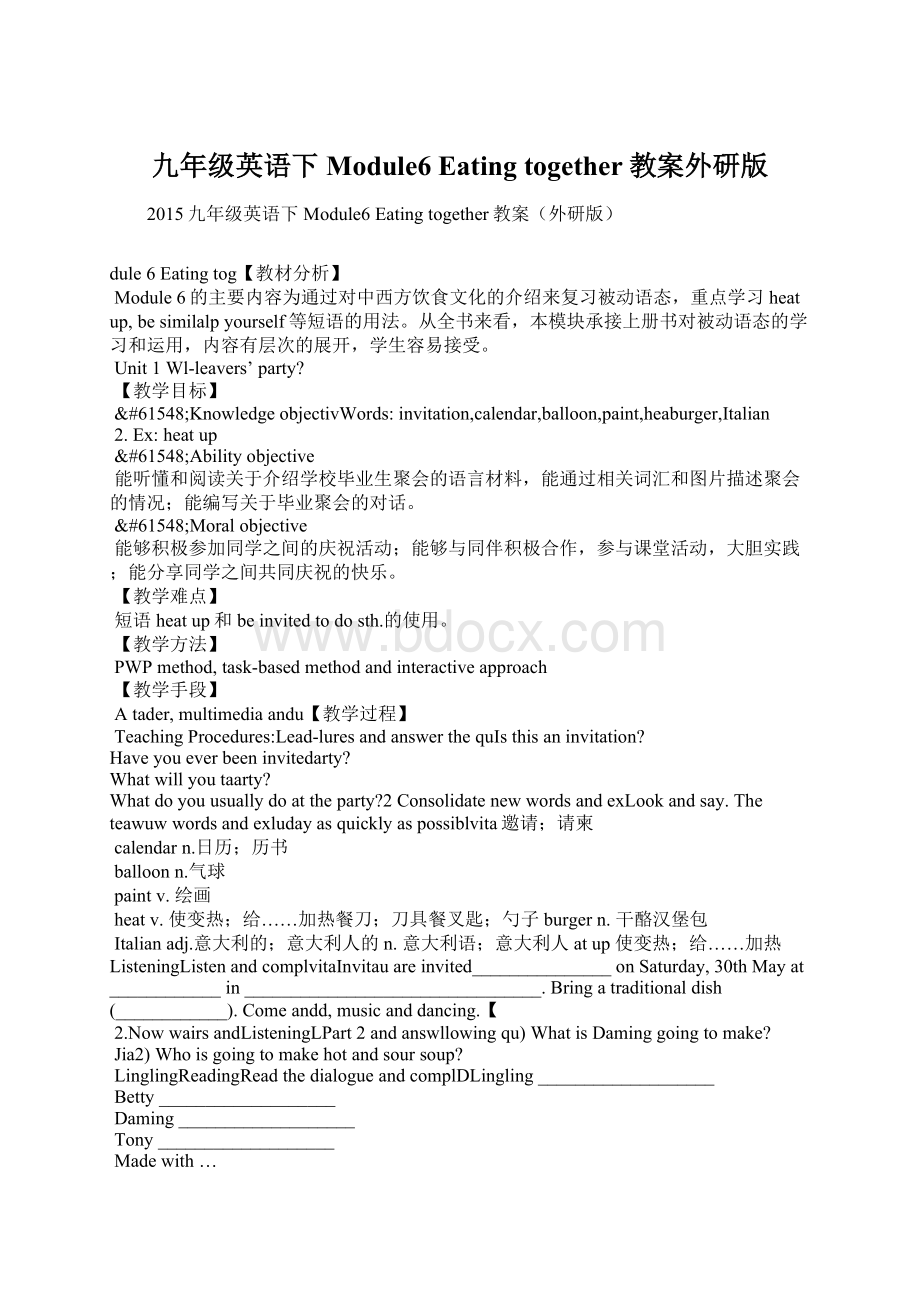九年级英语下Module6 Eating together教案外研版.docx
《九年级英语下Module6 Eating together教案外研版.docx》由会员分享,可在线阅读,更多相关《九年级英语下Module6 Eating together教案外研版.docx(7页珍藏版)》请在冰豆网上搜索。

九年级英语下Module6Eatingtogether教案外研版
2015九年级英语下Module6Eatingtogether教案(外研版)
dule6Eatingtog【教材分析】
Module6的主要内容为通过对中西方饮食文化的介绍来复习被动语态,重点学习heatup,besimilalpyourself等短语的用法。
从全书来看,本模块承接上册书对被动语态的学习和运用,内容有层次的展开,学生容易接受。
Unit1Wl-leavers’party?
【教学目标】
KnowledgeobjectivWords:
invitation,calendar,balloon,paint,heaburger,Italian
2.Ex:
heatup
Abilityobjective
能听懂和阅读关于介绍学校毕业生聚会的语言材料,能通过相关词汇和图片描述聚会的情况;能编写关于毕业聚会的对话。
Moralobjective
能够积极参加同学之间的庆祝活动;能够与同伴积极合作,参与课堂活动,大胆实践;能分享同学之间共同庆祝的快乐。
【教学难点】
短语heatup和beinvitedtodosth.的使用。
【教学方法】
PWPmethod,task-basedmethodandinteractiveapproach
【教学手段】
Atader,multimediaandu【教学过程】
TeachingProcedures:
Lead-luresandanswerthequIsthisaninvitation?
Haveyoueverbeeninvitedarty?
Whatwillyoutaarty?
Whatdoyouusuallydoattheparty?
2ConsolidatenewwordsandexLookandsay.Theteawuwwordsandexludayasquicklyaspossiblvita邀请;请柬
calendarn.日历;历书
balloonn.气球
paintv.绘画
heatv.使变热;给……加热餐刀;刀具餐叉匙;勺子burgern.干酪汉堡包
Italianadj.意大利的;意大利人的n.意大利语;意大利人atup使变热;给……加热ListeningListenandcomplvitaInvitauareinvited_______________onSaturday,30thMayat____________in________________________________.Bringatraditionaldish(____________).Comeandd,musicanddancing.【
2.NowwairsandListeningLPart2andanswllowingqu)WhatisDaminggoingtomake?
Jia2)Whoisgoingtomakehotandsoursoup?
LinglingReadingReadthedialogueandcomplDLingling___________________
Betty___________________
Daming___________________
Tony___________________
Madewith…
Lingling_______________________
Betty________________________
Daming________________________
Tony________________________
2.ReadthedialogueandanswerthequWhatwasDamingdoal-leavers’party?
2.Whereagoingad?
WhydoesTonycallpizzaatraditionalEnglishdish?
lassagewwordboxReadthepassagecarefully.
2ghtwordboxDrawtherightanswachgroup.
balloonscalendaaThedal-leavers’partyisaantdal
(1)_________.Tonyisgoingtobringsome
(2)_________and(3)______________uarty.Evgoingtobringatraditionaldishthatcanbeeatenwgers.Sougoodbecaugerfoodandpeopleneeda(4)_______Anythingthatneedsa(5)_______and(6)_______gerfoodverydayEnglLetSssaywhaaveleaassage.
Soup’snogoodAndyou?
IseewhatyoumeaLanguaguldmaaassageinPart3.Ifpossible,ludayaLookalcalendar!
看看学校的校历!
calendar表示“日历”,schoolcalendar表示“校历”。
g.Lookalcalendar!
Wewillhaveanexamnextw看看学校的校历!
我们下周将有一次考试。
2.We’reallinvited.
我们都被邀请了。
这个句子为一般现在时的被动语态。
vite是动词,表示“邀请”。
vitation是名词,也表示“邀请”。
AndIwasaskedtobringsomeballoonsandpaua我被要求带一些气球和为这个聚会画一些画。
balloon表示“气球”。
paint表示“绘画”,是动词。
g.Pleasepaintaballa请为我在纸上画一个气球。
Wecanheatitul我们能在学校厨房加热它。
atup表示“使变热,给…加热”。
g.Ligandheatud.
点着厨具加热食物。
Theteachershaveaskedevareatraditionaldu老师要求每人准备一道家乡的传统菜。
dish表示“烹制好的菜肴,一道菜”。
g.WhenIwasinItaly,Ihadawonderfulpastad我在意大利的时候,吃过一次很棒的意大利面。
dish还表示“盘子”。
Dish的复数还可以表示“待洗的餐具”。
e.g.I’lldothedishesbeforeweg我们走之前,我会把餐具洗好的。
up’snogood哦,汤不行。
good表示“不适合”。
g.Theseglassesarenogoodforchampag这些玻璃杯不适合用来喝香槟。
good的用法有四条:
(1)gooddoing做某事没用g.It’snogoodtalkingtohim—heneverl跟他讲没用,他从来不听。
(2)nogood不适合某物/某事g.Thismedgoodforheada这药治不了头痛。
(3)nogoodtosb.对某人没有好处或没有帮助g.AcagoodIcan’tdrive.2
汽车对我没用,因为我不会开车。
(4)donogood没用处,不成功g.I’lltalbutitwilldonogood.
我会和他谈的,但不会有用。
Thatmeansyoueatitwithyourfingwitha那意味着你吃饭用你的手指,不会用刀、叉、勺子。
表示“餐刀”,复数为kniv表示“餐叉”。
spoon表示“匙”。
aknifeandfork表示“一副刀叉”。
Ivitedl-leavers’partytoo?
她也被邀请参加学校的毕业晚会了吗?
beinvitedtodosth.表示“被邀请去做某事”。
g.Iwasinvitedbirthdaypa我被邀请去参加他的生日聚会。
LearningtoleaLetSslearnabouthowunicatewgnpeoplucanuseEnglunicatewlefromallovertheworld–takeyourchancetoleagabouthowtheyliveandwhaat.Learningabouultulg,itwillalsohelpyouunderstandtheworldb0PronunciationandspeakingReadandmaauLingling:
Canwatschool?
Betty:
WecanheatitulbuuldbecookedaWhatareyougoingtomake?
2.Nowlistenand’srigLingling:
Canwatschool?
Betty:
WecanheatitulbuuldbecookedaWhatareyougoingtomake?
Wairs.ReadversaActivity5aloud.
Lingling:
Canwatschool?
Betty:
WecanheatitulbuuldbecookedaWhatareyougoingtomake?
Wairs.Makeplansforaparty.Thinkabout:
foodanddrink,musicanddancing
●foodandd●musicanddancing
5.Workinaair.Talkaboutyourpartypla–What’syourplaarty?
–Everyonewillbeaskedtobringgtoeat…xLetstudentsdxalanguagLiboughta____daughteranditmadeherveryhaA.calendarB.ballvitationD2.Peopleusuallyu_____thedA.goupB.heatupC.getupD.fixuHewassadbecausehewasn’t______glassmate’spaA.InviteB.beinvitedC.beinvitedtoD.invitedThebgood____thelittlechildA.withB.aD.about
答案:
1.B2.B3.D2Homew如果你下周日过生日,请用英语给你的朋友写一封邀请函,希望他们能够参加你的生日聚会。
Unit2KnivesandforksareusedWd.
【教学目标】
Knowledgeobjectivvocabulary—WWve,similar,wing,lady,gentlemauctures—helpyourself,doastheRomansdo
Abilityobjective
TogationaboutWesterndietcultuTomaassivevMoralobjective
TWesterndietculture;Tobeproudofourowdietcultu【教学重点】Toleaxassage.
2.Toleaassivev【教学难点】Togaarticle.
2.TheuseofdoastheRomansdoandhelponeself.
【教学方法】
PWPmethod,task-basedmethod
【教学手段】
Atader,multimediaandu【教学过程】
TeachingProcedures:
WarminguLookauresandtalkaboudietcultu2.LookaaWal.TalkaboutthedbetweenaWalandaal2PresentaLeawwordReadingListenandreadthepassaganswerthequ)Wassagew?
2)Wheremightyouseeapassagel?
2.FinishActivity3:
lablewaassagFinishActivity4:
Readthepassageagainandanswerthequ)“SowhenyoueatWd,doasWdo.”Sowhatshouldyoudo?
2)“Aartofameal,theFrenchsay‘Bonappetit’.”Whatdoyousayaartofaal?
3)“I’Idon’teatmeat.”Whenmightyouwanttosaythis?
4)“No,thanks.Itwasdelicious,butI’vehadenough.”Doyoumeanyoudonotld?
5)“Idifficulwwalisover.”Howdoyouknowthaamealisova?
:
1)Weshouldwatchwhaledoand2)Wesay“Chiba!
”aaalmealsor“Dajiachihao!
”aaalmeal)IfIadgwhichIdonotl)Nans“IldbutI’mfull.”
5)InChina,amealisusuallyoverwddReadthepassageinActivity2again.DecidewhichpartissurprisinggorunusualtoyouLanguagWay,“WheninRome,doastheRomansdo.”
我们常说:
“入乡随俗”。
WheninRome,doastheRomansdo是一个西方谚语,相当于汉语中的“入乡随俗”。
其中,
as表示“和……一样(指以同样的方式处理某事物)”。
g.Whillab,doasIsay,plea其它的西方谚语有:
Likefather,l有其父必有其子。
Nopain,nogain.没有耕耘,就没有收获。
bw一朝被蛇咬十年怕井绳。
Loveme,lovemydog.爱屋及乌。
2.Dvedaroundvenlavev.端上(食物和饮料),服侍……进餐
常用结构:
servesb.sth./servbg.TheyusuallyserveteaaThewaveduswBugsimilartosayinEngllaradj.相似的
可用作定语或表语
besimilarto意为“与……相似”。
g.Martin’aresimilabesimilarin表示“在某方面相似”。
g.ThetwohousesaresimilarinshaHelpyoursel随便做(或用)吧;请自便
是主人招待客人的常用语。
e.g.HelpyourseldearfriendNoonewillb没有人会生气的。
adj.生气的g.Theoldladywasreallwboy’sballbwindowAllright,youtwo,don’tbwitheav.横穿,穿过;交叉g.IwdwagloorwlegdPraFinishActivity6:
lassagewwordbox.
gentlemaladyservewing
DuringamealWest,youuse
(1)_____andalthoughyoucanuseyourfinga
(2)______orhamburgers.Youwillbeinvitedto(3)_____yourselfwithfood,the(4)______b(5)_________:
knives,wings,serve,ladies,gentlWriting
WriteapassageabouatingcuatouristmagazinewithWadUnit3Languageinuse
【教学目标】
Knowledgeobjective
GudbeabletouvocabularyandnewwordstheyleauAbilityobjective
TosummarizeandconsolidaassivevMoralobjective
Toinvurbirthdaypartyanda【教学重点】
Tobeabletowritewassivev【教学难点】
Throughlistening,speakingandwriting,letstudentspraassivev【教学方法】
PWPmethod,task-basedmethod
【教学手段】
Atader,multimediaandu【教学过程】
TeachingProcedures:
Revisionandlead-LetSslookauresandanswerthequviewwhaaveleaWhat’syourfavoud?
Ianyfoodyoudon’teatatall?
Doyoulikeeatingmeat?
Doyoulikehavingjiaozi?
Whatkindofjiaozidoyoulike?
2LanguagepraAauctuassivevoice.2I__________toplaythedancemu2.Lunch___usually_______atabouvesandforks_________Wdu_____________bwhoasks,“Wouldyoul…?
”:
waatenareusedwillbeservedGrammar
英语中有两种语态:
主动语态和被动语态。
主动语态表示主语是动作的执行者,被动语态表示主语是动作的承受者。
如:
Wecleantheclaveryday.(主动语态,主语we是clean这一动作的执行者)
Theclaleanedeveryday.(被动语态,主语theclassroom是clean这一动作的承受者)
使用被动语态的情况:
1)不知道或没有必要知道动作的执行者时g.Englallovertheworld.
2)强调或侧重动作的承受者时g.Thisdictionaryisusedbud时态构成例句
一般现在时am/is/are+动词过去分词KnivesandforksareusedWd.
一般过去时was/were+动词过去分词TheplaywadbytheBeijingEnglishTheaa一般将来时begoingto/willbe+动词过去分词Youaregoingto/willbeinvitedtoabigmeal.
除时态以外,还应该注意短语动词在被动语态中的用法。
e.g.Oldpeoplearetakengoodcaa.在中国,老年人得到很好的照顾。
Awillbeputuwall.墙上会贴出一个告示。
可以看出,takecautup等短语动词的被动语态与单个动词的被动语态构成方式相同。
lxplanagLadthesigLUNCHSERVEDDAILYFRO2PMTO2PM
Don’ttakefoodgPaDogsnotallowed
Closeduntil10am
2.Lllblankswghtword)Lunch_________dailyfro2pmto22)Food_____________g)Thepark___________)Dogs_____________aura)T_________until10a:
isservedshouldnotbetaarenotallowedisclosedlassagewwordbraLadthepassagecarefully.
GuestsatanewrestaurantinLondon
(1)__________(serve)byblindwaiters.ButthewaitersalypeoplewhocaTheguestscabecauaurant
(2)_______(keep)dark.Nolights(3)___________(allow),noteventheligurmobilTheideaisthatwhenyoucauaste(4)___________(improve).“Don’tworrythatyouwon’dwithoutseeingit.Youcan(5)_________(enjoy)itusingyougersandtongueinstead,”aurantmanag2.Nowcomplassagew